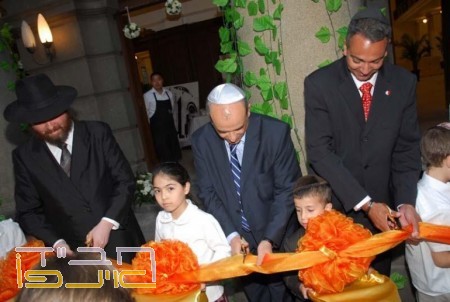
Shanghai surprise:
another Jewish coup
When the World Expo 2010 opened
in Shanghai this month, the spectacular Israel pavilion created a stir
within the Jewish community. Full
article
Cleveland Jewish News
15 Sivan
5770 (28.05.2010)
When the World Expo 2010 opened in Shanghai this month, the
spectacular Israel pavilion created a stir within the Jewish community.
But that is not the only Jewish building in Shanghai attracting accolades. Much attention is being paid to the grand reopening of Shanghai’s Ohel Rachel (House of Rachel) Synagogue, which will now be available to the Jewish community during the Expo. Tycoon Jacob Sassoon built the ivy-covered shul on Shaanxi Road in 1920 in memory of his wife Rachel.
When the majority of the Sephardic and refugee Jews left Shanghai in the early 1950s, the Greek Revival-style temple reverted to governmental control. The stately building was used for the next 50 years as a warehouse and office space for the Shanghai education ministry.
The synagogue’s ribbon-cutting ceremony on May 6, the eve of the six-month-long World Expo, which is expected to draw 70 million visitors, signals the Chinese government’s recognition and respect of the needs of the burgeoning Shanghai Jewish community. It also offers a warm welcome to the expected 35,000 Jews who will visit the Expo.
Shanghai’s Chabad Lubavitch Rabbi Shalom Greenberg (brother of Solon’s Rabbi Zushe Greenberg), who arrived in the port city in 1998 to head the Shanghai Jewish Center, played an instrumental role in securing the cooperation of the Chinese government for the Jewish community. Over the past 12 years, Greenberg and his wife Dini (née Alevsky) have reached out to the city’s 1,500 Jewish residents – the majority of them American and French expats – and thousands of visiting tourists and businesspeople.
Since their arrival in Shanghai, the Greenbergs were entranced by the grand, opulent synagogue that houses 30 19th-century Torah scrolls from Baghdad and contains gorgeous marble pillars framing the entrance to the Ark, grand crystal chandeliers, and highly polished wooden pews.
Determined that the synagogue’s holiness, sanctity and grandeur once again be available to the Jewish community, the Greenbergs and other high-ranking Jewish community members and religious leaders, petitioned Shanghai officials to let them use the synagogue on a regular basis.
Eventually the government allowed use of the building for major Jewish holidays.
The government’s permission to use the synagogue during the Expo for Shabbat services and meals is “a tremendous gesture and a return of Jewish life to a culturally and historically important synagogue,” Greenberg notes.
To prepare the synagogue for regular use and to present it in the best light, Greenberg tapped the Chabad of Shanghai donor base and beyond to raise hundreds of thousands of dollars to renovate and refurbish the 90-year-old structure. He also brought in the “Expo Rabbi,” his brother-in-law Mendy Alevsky.
Alevsky, son of University Heights residents Dvora and Rabbi Leibel Alevsky, and his wife Sara arrived in Shanghai from New York in April to help the Chabad staff provide kosher meals, classes, tours of Shanghai’s historical Jewish sites, and Shabbat services to Expo visitors.
“If an Expo visitor has a yahrzeit and they want to say kaddish, we help them get a minyan together,” says Alevsky.
One of the first tasks facing the Alevskys and other area Jewish Shanghai clergy was to organize and prepare a grand kosher dinner for the 800 guests invited to the opening of the Israel Pavilion at the Expo.
They relied on the shochet (ritual slaughter) the Greenbergs had previously brought to Shanghai to provide the kosher meat and kashered the kitchen of a Shanghai restaurant to prepare all the kosher meals.
The Shanghai Jewish Center has an on-site chef who prepares four-course meals for the Center’s restaurant or for take-out. “Businessmen and tourists who keep kosher usually eat whatever nonperishable foods they can squeeze into their suitcases on plastic plates and disposable silverware,” says Alevsky. “So to come across tasty, warm, freshly prepared kosher food is a huge treat.”
As they greet Jewish visitors from France, America, Australia, Germany, Brazil and Israel, the Alevskys are overjoyed to represent the Chabad community. “Travelers often yearn for a home-away-from-home, and it’s a pleasure to see their faces light up when they meet our community and know we are here,” Alevsky remarks. “People who might not be very observant suddenly have a desire to connect with fellow Jews when traveling abroad.”
The Alevskys easy transition to life is Shanghai is due to “my sister and brother-in-law’s guidance who, since 1998 have learned all the lessons the hard way in every aspect of life here,” he says. “They are indispensable, as very few Chinese people speak English well enough for us to communicate with.”
Working in Shanghai will provide invaluable experience for the Alevskys, who plan to open their own Chabad House somewhere in the world.
“We are following the passion of the Lubavitcher Rebbe, who taught all of us that if there are Jews who need Judaism, we must be there to make it available for them,” Alevsky explains. “Every Jew is precious, and we are honored to be fulfilling the Lubavitcher Rebbe’s vision, and thereby receiving his holy blessing.”
But that is not the only Jewish building in Shanghai attracting accolades. Much attention is being paid to the grand reopening of Shanghai’s Ohel Rachel (House of Rachel) Synagogue, which will now be available to the Jewish community during the Expo. Tycoon Jacob Sassoon built the ivy-covered shul on Shaanxi Road in 1920 in memory of his wife Rachel.
When the majority of the Sephardic and refugee Jews left Shanghai in the early 1950s, the Greek Revival-style temple reverted to governmental control. The stately building was used for the next 50 years as a warehouse and office space for the Shanghai education ministry.
The synagogue’s ribbon-cutting ceremony on May 6, the eve of the six-month-long World Expo, which is expected to draw 70 million visitors, signals the Chinese government’s recognition and respect of the needs of the burgeoning Shanghai Jewish community. It also offers a warm welcome to the expected 35,000 Jews who will visit the Expo.
Shanghai’s Chabad Lubavitch Rabbi Shalom Greenberg (brother of Solon’s Rabbi Zushe Greenberg), who arrived in the port city in 1998 to head the Shanghai Jewish Center, played an instrumental role in securing the cooperation of the Chinese government for the Jewish community. Over the past 12 years, Greenberg and his wife Dini (née Alevsky) have reached out to the city’s 1,500 Jewish residents – the majority of them American and French expats – and thousands of visiting tourists and businesspeople.
Since their arrival in Shanghai, the Greenbergs were entranced by the grand, opulent synagogue that houses 30 19th-century Torah scrolls from Baghdad and contains gorgeous marble pillars framing the entrance to the Ark, grand crystal chandeliers, and highly polished wooden pews.
Determined that the synagogue’s holiness, sanctity and grandeur once again be available to the Jewish community, the Greenbergs and other high-ranking Jewish community members and religious leaders, petitioned Shanghai officials to let them use the synagogue on a regular basis.
Eventually the government allowed use of the building for major Jewish holidays.
The government’s permission to use the synagogue during the Expo for Shabbat services and meals is “a tremendous gesture and a return of Jewish life to a culturally and historically important synagogue,” Greenberg notes.
To prepare the synagogue for regular use and to present it in the best light, Greenberg tapped the Chabad of Shanghai donor base and beyond to raise hundreds of thousands of dollars to renovate and refurbish the 90-year-old structure. He also brought in the “Expo Rabbi,” his brother-in-law Mendy Alevsky.
Alevsky, son of University Heights residents Dvora and Rabbi Leibel Alevsky, and his wife Sara arrived in Shanghai from New York in April to help the Chabad staff provide kosher meals, classes, tours of Shanghai’s historical Jewish sites, and Shabbat services to Expo visitors.
“If an Expo visitor has a yahrzeit and they want to say kaddish, we help them get a minyan together,” says Alevsky.
One of the first tasks facing the Alevskys and other area Jewish Shanghai clergy was to organize and prepare a grand kosher dinner for the 800 guests invited to the opening of the Israel Pavilion at the Expo.
They relied on the shochet (ritual slaughter) the Greenbergs had previously brought to Shanghai to provide the kosher meat and kashered the kitchen of a Shanghai restaurant to prepare all the kosher meals.
The Shanghai Jewish Center has an on-site chef who prepares four-course meals for the Center’s restaurant or for take-out. “Businessmen and tourists who keep kosher usually eat whatever nonperishable foods they can squeeze into their suitcases on plastic plates and disposable silverware,” says Alevsky. “So to come across tasty, warm, freshly prepared kosher food is a huge treat.”
As they greet Jewish visitors from France, America, Australia, Germany, Brazil and Israel, the Alevskys are overjoyed to represent the Chabad community. “Travelers often yearn for a home-away-from-home, and it’s a pleasure to see their faces light up when they meet our community and know we are here,” Alevsky remarks. “People who might not be very observant suddenly have a desire to connect with fellow Jews when traveling abroad.”
The Alevskys easy transition to life is Shanghai is due to “my sister and brother-in-law’s guidance who, since 1998 have learned all the lessons the hard way in every aspect of life here,” he says. “They are indispensable, as very few Chinese people speak English well enough for us to communicate with.”
Working in Shanghai will provide invaluable experience for the Alevskys, who plan to open their own Chabad House somewhere in the world.
“We are following the passion of the Lubavitcher Rebbe, who taught all of us that if there are Jews who need Judaism, we must be there to make it available for them,” Alevsky explains. “Every Jew is precious, and we are honored to be fulfilling the Lubavitcher Rebbe’s vision, and thereby receiving his holy blessing.”
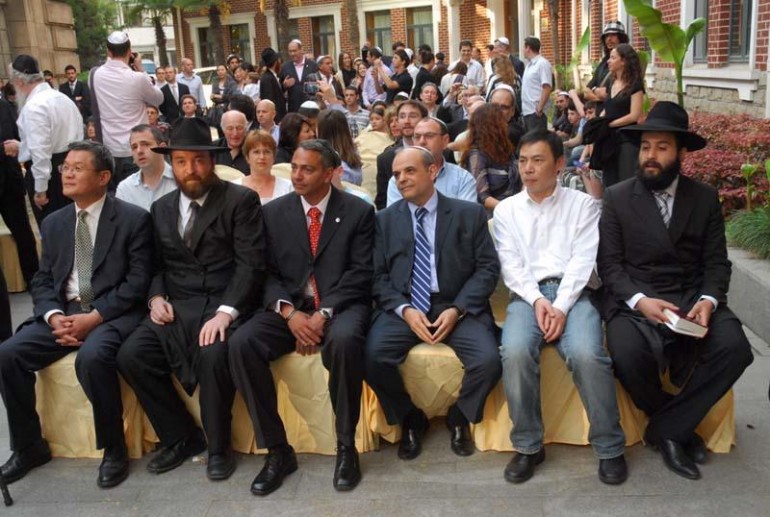
| |
|
Chabad Rabbi Shalom Greenberg, left, attends the reopening of Ohel
Rachel with dignitaries from Israel and from the Shanghai Jewish
community.
|
|
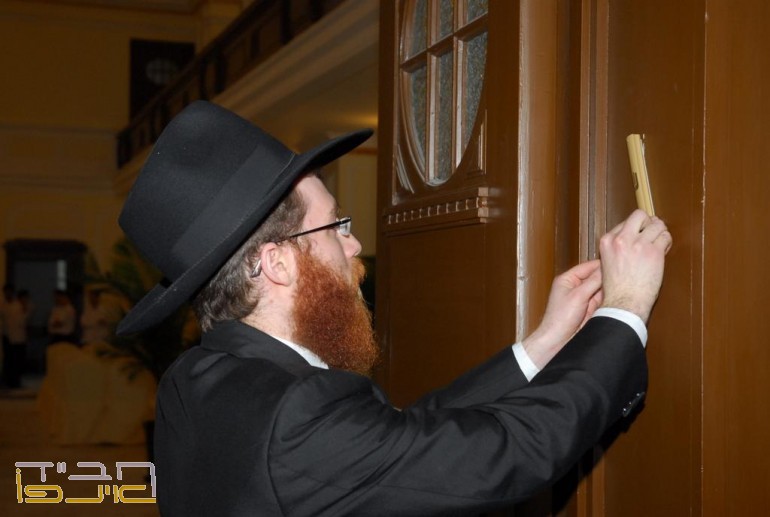
| |
|
Rabbi Mendy Alevsky was honored to affix one of the mezuzahs in the
Ohel Rachel shul.
|
|
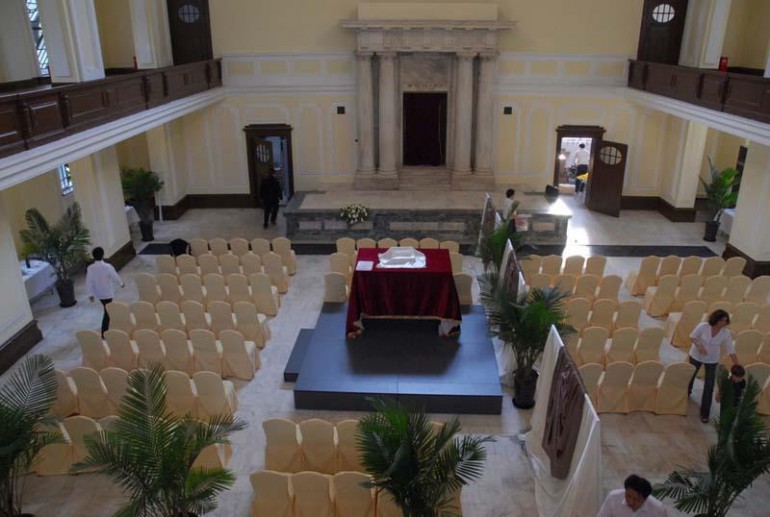
| |
|
The newly renovated and refurbished synagogue has brought the
immense building back to its full 1920 glory, when it was built by the
Sassoon family.
|
|
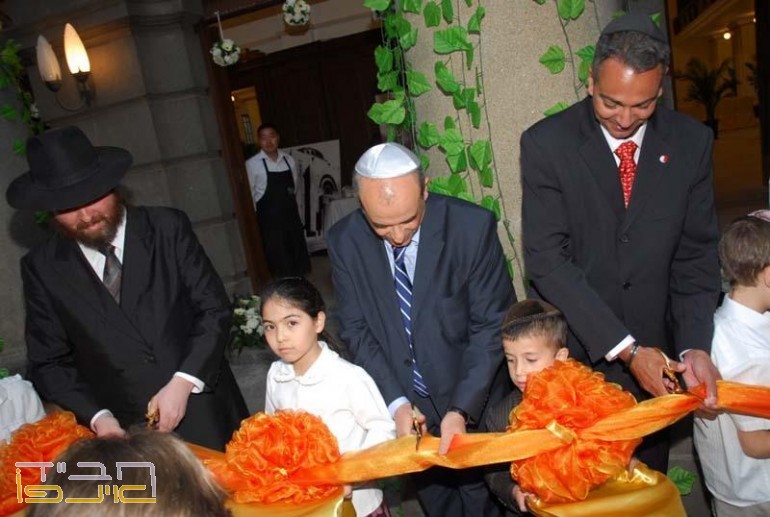
| |
|
Cutting the ribbon are, from left, Rabbi Shalom Greenberg, Jewish
community president Maurice Ohana, and Consul General of Israel Jackie
Eldan.
|
|
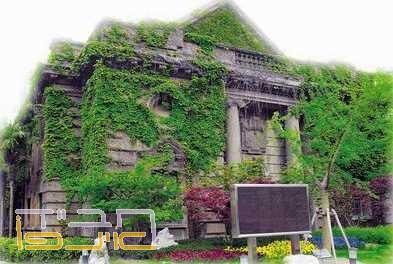
| |
|
The historic Ohel Rachel Synagogue will be open every Shabbat for
Shanghai’s Jewish community and visitors to the 2010 Expo.
|
|

